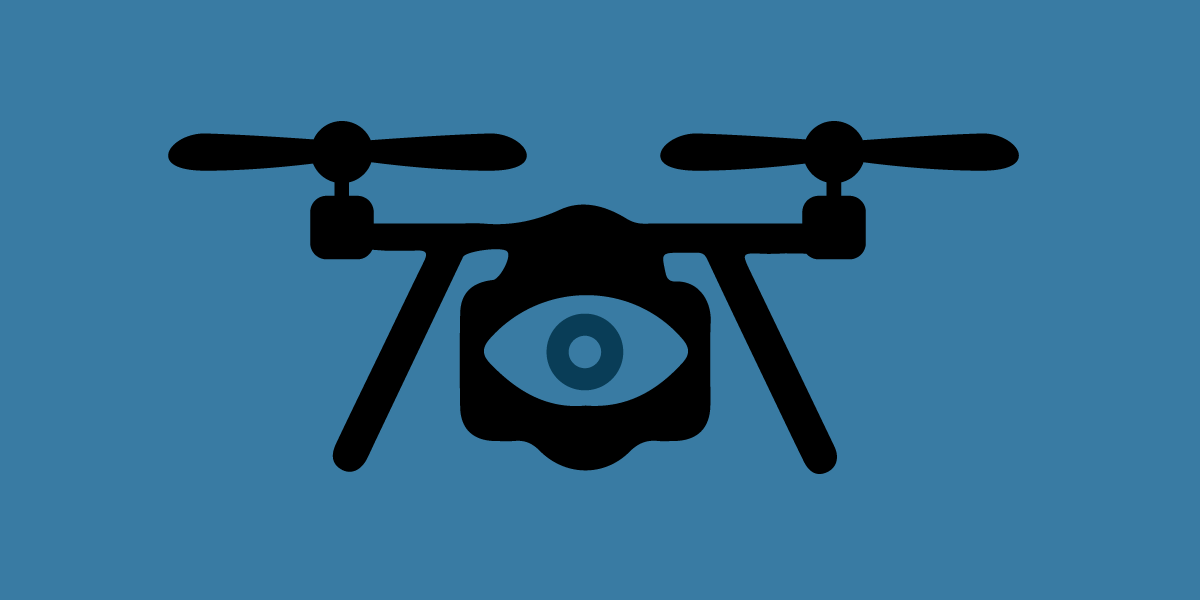Taser and surveillance vendor Axon has proposed what it claims to be the solution to the epidemic of school shootings in the United States: a remote-controlled flying drone armed with a taser. For many many reasons, this is a dangerous idea. Armed drones would mission-creep their way into more every-day policing. We must oppose a process of normalizing the arming of drones and robots.
EFF has stated strongly before that drones and robots, whether they be autonomous or remote-controlled, should not be armed–either with lethal or “less-lethal” weapons. And we’re far from the only group to do so.
Police currently deploy many different kinds of moving and task-performing technologies. These include flying drones, remote control bomb-defusing robots, and autonomous patrol robots. While these different devices serve different functions and operate differently, none of them—absolutely none—should be armed with any kind of weapon.
Mission creep is very real. Time and time again, technologies given to police to use only in the most extreme circumstances make their way onto streets during protests or to respond to petty crime. For example, cell site simulators (often called “Stingrays”) were developed for use in foreign battlefields, brought home in the name of fighting “terrorism,” then used by law enforcement to catch immigrants and a man who stole $57 worth of food. Likewise, police have targeted BLM protesters with face surveillance and Amazon Ring doorbell cameras.
We cannot state this strongly enough: if police get their hands on taser drones, they will not sit in a warehouse until the next emergency mass shooting situation. History has proven this. We will see them flying over protests and shopping districts. We will hear news stories about police using a drone to taser someone for vandalism, petty theft, or fleeing the drone. It will not be a matter of if, but when.
Police will be more likely to use this kind of force if the entire process feels like a video game—if they can send tens of thousands of volts through a person’s body with the push of a button far removed from that person. And the person at risk of being tased might not hear the drone’s commands or may be confused by the presence of a floating robot.
Police use of tasers have killed over 500 people since 2010, according to a study on the lethality of the technology done by USA Today in 2021.
The Axon Ethics Board has voted firmly against Axon moving forward with this project.
Armed drones are just one part of a multi-part strategy from Axon for selling products that they claim might curb mass incidents of gun violence. Axon has also announced a partnership with Fusus, a company that specializes in consolidating private security camera feeds and giving police live access. EFF raised concerns in 2020 when police in Jackson, Mississippi, announced a pilot program with Fusus to get live access to video streams from private cameras, ranging from commercial security cameras to resident’s private Ring doorbell cameras.
This would create, with the permission of the camera owners but not the people who walk by them every day, a massive surveillance network. Like drones, it will ultimately be used by police much more often than in rare critical emergency situations.
We’ve seen this before. Time and time again, police conjure the extreme worst-case-scenario threat in order to deploy extraordinary powers, which end up being used in everyday acts of policing which disproportionately affect the lives of people of color, immigrants, and other vulnerable members of society. Before these tools are deployed, we demand that armed police drones never see the light of day.
Axon has announced a Reddit AMA here on Friday, June 3, 2022, to ask questions about these new products. Ask questions about your concerns. You can ask questions like: How do you feel about making a dangerous technology that will likely be used in other less dire scenarios than their preferred use case? Why has your ethics advisory board condemned the project? Will that stop you?
Disclosure: EFF's Surveillance Litigation Director Jennifer Lynch serves on the Axon AI Ethics Board in her personal capacity.




